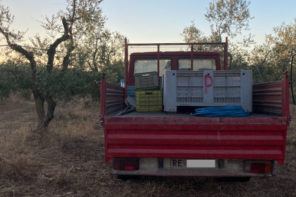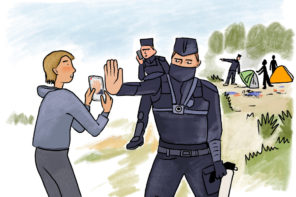What are the intended/unintended consequences of anti-smuggling and anti-trafficking policies?
Although aimed at reducing the suffering and risk incurred by migrants, forced and otherwise, most anti-smuggling and anti-trafficking policies reinforce the current trend of criminalising migration and militarising borders. Furthermore, and as dangerously, virtually all the current White House’s statements on migration – as well as the various memoranda, statements and policy papers from the US Department of Homeland Security and Immigration and Customs Enforcement (ICE) – emphasise the crime, danger, and violence of border crossing. This causes the complex reasons for flight to be swept up in a discourse of policing and violence that not only affects victims of smuggling and trafficking, but possible Convention refugees and undocumented persons as well.
The overt intentions of these policies is, according to the ICE website, to put an end to these practices.
“In its worst manifestation, human trafficking is akin to modern-day slavery. Victims pay to be illegally transported into the United States only to find themselves in the thrall of traffickers. They are forced into prostitution, involuntary labor and other forms of servitude to repay debts – often incurred during entry into the United States”.
Of smuggling, the site states that:
“Human smuggling is the importation of people into a country via the deliberate evasion of immigration laws. This includes bringing illegal aliens into a country, as well as the unlawful transportation and harboring of aliens already in a country illegally. Some smuggling situations may involve murder, rape and assault”.
The veracity of these statements can hardly be challenged, but neither definition tells the real story about those who are pushed from their community by violence, or who are pulled to the US by the quest for a different life or by the desire to reunite with family members, or by the desire to experience movement through the Americas.
Are border fortifications/restrictions a useful or counterproductive response to mass movements of people?
One of the standard lines used against undocumented people is that they steal jobs by queue jumping, and threaten the economies of the host country. However, a significant cadre of experts argue that by dramatically changing our approach to borders would could actually improve local economies. Moses et al. for example highlights that respected economists from major institutions now argue for open borders, and to consider his examples and sources suggests that the idea shouldn’t be too easily dismissed.
Even the most skeptical economists realise that the economic costs of immigration are remarkably small.
They review the work of three commentators from three strongly conservative organizations, namely: Phillipe Legrain, former journalist for The Economist; Lant Pritchett, an economist at the World Bank; and Jason Riley, an editorial board member at the Wall Street Journal. While their individual arguments vary, they include suggestions that: the free movement of people is just as beneficial as the free movement of goods and capital; societies from developed countries need to devise better mechanisms for supporting, integrating and assimilating immigrants from the developing world; and open borders are consistent with some basic values and traditions that underwrite countries such as the US.
Not all economists, of course, believe that the benefits of greater immigration outweigh the costs. But even the most skeptical economists realise that the economic costs of immigration – if they do, in fact, exist – are remarkably small and vary by level of aggregation. The costs associated with undocumented immigrants is probably even smaller, as these workers pay local and payroll taxes, but shy away from (or do not need) many of the public services that these taxes support.
Few people would imagine that commentators associated with the Wall Street Journal, the World Bank or The Economist would agree on such a policy, but if we examine the current system of abuse and punishment more closely, it’s surprising that more people don’t. It’s important to spread the word, because people all over the world are accustomed to seeing undocumented people doing fundamental tasks, yet don’t speak out when these same people, especially workers, are subjected to ‘crackdowns’, arrest, and deportation. In other words, it’s commonplace to think that when undocumented workers have finished building our stadium, painting our home, weeding our garden, or picking our crops, it’s acceptable to unceremoniously make them disappear, forever. It’s not.
→ Back to the virtual roundtable.









